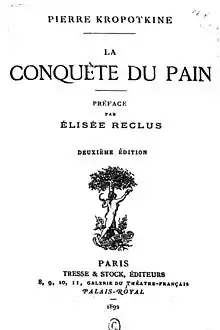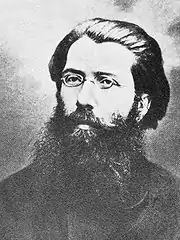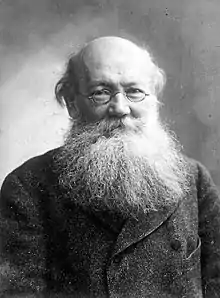無政府共產主義
无政府共产主义[lower-alpha 1][15][16](英語:[17][18][19][20])是一种支持废除国家、资本主义、僱傭勞動、等级制度[21]及生产资料私有制(但无政府共产主义尊重在集体所有制下的个人财产[22]),同时拥护生产资料公有制[23][24]及由工人委員會所构成的横向网络所统领下依照各盡所能、各取所需进行直接民主制[25][26]的政治哲学及思想流派。其中的一些流派,比如暴动无政府主义受利己主义和激进个人主义影响颇深,并认为无政府共产主义是实现个人自由的最好社会组织形式[27][28][29][30]。大多数无政府共产主义者视无政府共产主义为一种调和个人与社会之间矛盾的方式[31][32][33][34][35]。
| 系列条目 |
| 無政府共產主義 |
|---|
 |
|
无政府共产主义发展自法国大革命后的激进社会主义潮流[36][37],但直到第一国际在意大利的分部成立后才成型[38]。俄国思想家克魯泡特金在無政府共產主義中影响力十分巨大,并影响到了其后的内部分化[39]。迄今为止,最知名的无政府共产主义社群例包含1936年西班牙革命中的无政府工团主义地区[40]及在1918年至1921年俄国内战中由乌克兰革命者内斯托尔·伊万诺维奇·马赫诺所统领的马赫诺运动。马赫诺运动受克鲁泡特金著作中的无政府共产主义及集體無政府主義影响极大,且一度击退白军和红军,统治乌克兰的大多数地区,但最终被布尔什维克所占领[41]。
1929年,韩国无政府共产主义联合会在崇尚无政府主义和独立行动主义的將軍金佐鎮的支持下一度建立了一个无政府共产主义社会,但最终随着大日本帝国暗杀了金佐鎮并自南方入侵该地区,同时中國國民黨从北部入侵该地区,该地区很快便丧失了自治权,最终被并入大日本帝国的附庸满洲国。在1936年开始的西班牙内战中,西班牙无政府主义者经过在西班牙革命期间的努力和影响,一度在阿拉贡的多数地区建立了一个无政府主义社会,并且将无政府共产主义传播至了雷凡特、安达卢西亚及加泰罗尼亚,但最终被佛朗哥所统领的國民軍所击败[42]。
历史
早期先驱
一些早期基督教社区被认为具有无政府共产主义的倾向[43]。弗朗克·西弗·比林斯称“耶稣主义”是无政府主义与共产主义的结合体[44]。晚期基督教平等主义社区的典例是英格兰的挖掘派[45][46]。该运动的领导者傑拉德·溫斯坦利在他1649年的小冊子《新正义法典》中寫道:「不應有買賣、不應有集市或市場,但整個地球應該是每個人共有的寶藏」、「不應有統治他人的統治者,但每個人應是自己的統治者。」[47][36]
挖掘派抵制统治阶级和国王的暴政,以合作的方式完成工作,管理供应并提高社会生产力。由于挖掘派建立的公社没有私有财产,没有经济交换(所有物品、货物和服务都由集体所有),他们的公社可以被称为早期的共产主义社区,这些公社分布在英格兰的农村地区。
在第一次工业革命之前,整个欧洲大陆盛行土地和财产共同所有的风气,但挖掘派因其反对君主统治的斗争而显得与众不同。他们在查理一世倒台后又因提倡工人自治而再次兴起。
1703年,路易·拉洪坦在其小说《北美新航路》一书中概述了北美大陆的原住民社区是如何合作和组织的。拉洪坦发现殖民前北美的农业社会和社群无论是经济结构角度还是从没有任何国家角度都与欧洲基于君主制的、不平等的国家制度完全不同。他写道,土著人处于“无政府状态”的生活中,这也是这个词第一次被用来表示混乱以外的东西[48]。他具体写道,殖民前的北美没有牧师、法院、法律、警察、国家部长,也没有财产的区分,因此他们都是平等的,都在一起繁荣,没有办法区分贫富[49]。
法國大革命期間,席爾凡·馬雷夏爾在《平等者宣言》中要求「共同享有地球的產物」,並期待「貧富、大小、主僕、統治與被統治之間的噁心差別」的消失[50][36]。
约瑟夫·迪亚契与1848年革命
约瑟夫·迪亚契是早期的無政府共產主義者,也是第一位稱自己為自由意志主義者的人。[51]他提出與普魯東不同的看法:「工人無權於他或她勞動所得的產物,但有權滿足他或她的需求,無論其性質為何」。[36][52]无政府主义史学家麦克斯·奈特劳称自由意志共产主义在历史上第一次被使用是在1880年11月法国的一个无政府主义大会上,该大会采用了这个词来更清楚地描述其理论[53]。随后法国无政府主义记者、四卷本《无政府主义百科全书》的建立者及主编塞巴斯蒂安·富尔于1895年创办了《自由意志主义者》周报[54]。
第一国际
| 系列条目 |
| 无政府主义 |
|---|
 |
|
作为一套连贯的现代经济政治哲学,无政府共产主义最早的支持者包括第一国际意大利分部的卡洛·卡菲罗、埃米利奥·科维利、埃里科·马拉泰斯塔、安德烈·科斯塔及一些前马志尼共和派[55]。集體無政府主義者主张在按需分配下保留劳动报酬制度[56],但主张在革命后向共產制度转型时废除劳动报酬制度,改用按需分配制度。受到巴枯寧的影響,詹姆士·季佑姆在論文《关于社会组织》中提到:「當……生產超越了消費……每個人將從社會豐富的物品儲備中得到所需,不用擔憂耗盡;而且道德情操將在自由與平等間高度發展,工人將會阻止,或大量減少濫用與浪費。」[57]
集体无政府主义者认为应将生产资料的所有权集体化,同时保留与每个人的劳动量和劳动种类相称的报酬,而无政府共产主义者则进一步要求将劳动产物同样集体化。虽然这两个团体都反对资本主义,但无政府共产主义者不再认同蒲鲁东和巴枯宁认为个人有权获得其个人劳动的产品这一点。埃里科·马拉泰斯塔认为:“与其冒着混淆的风险区分你和我各自所做的事情,不如让我们都工作,把一切生产所得放在一起。这样,每个人都能竭尽所能地劳动直到物质极大充裕,每个人都能尽可能地取其所需直到某一物质不再极大富裕”[58]。
卡菲罗在他1880年的著作《安那其与共产主义》中进一步解释道,劳动产品的私有化将导致资本的不平等积累,从而导致社会阶级及其对立的重新出现;进而导致国家的复活:“如果我们容许私人占有劳动产品,我们就将被迫保留货币,使财富或多或少地按照个人的功绩而非个人的需要积累”[36]。1876年,受警察活动影响,第一国际的意大利联合会不得不在佛罗伦萨外的一个森林里举行了佛罗伦萨会议,他们宣布了无政府共产主义遵循的原则如下:
第一国际意大利联合会认为,集体化劳动产品是对集体主义方案的必要补充,一切人为满足一切人的需要提供援助是符合团结原则的唯一生产和消费规则。意大利联合会在佛罗伦萨举行的第一国际会议就这一点已达成一致。
马拉泰斯塔和卡菲罗后来将上述原则整理进了一份文章,并将其发表在了瑞士汝拉联盟的公报上。
彼得·阿列克谢耶维奇·克鲁泡特金
彼得·阿列克谢耶维奇·克鲁泡特金常被视为最重要的无政府共产主义理论家,他在他的著作《面包与自由》和《田野、工厂和工场》中概述了他的无政府共产主义经济学理念。克鲁泡特金相信合作比竞争对人类益处更大,并在《互助论:进化的一个要素》一书中阐述了在大自然中能支持这一点的证据。克鲁泡特金支持通过“全部社会财富收归公有”的方式废除私有制[59],并以此为基础组织起平等的自愿联合组织管理经济[60],根据个人的物质需要而非根据劳动来分配商品[61]。克鲁泡特金还认为,随着社会的进步,这些物质需要将不仅仅仅局限于纯粹的物质需要:“他的物质的需要一经满足,其他的可以说是带有艺术性质的欲求,便会立刻发生。这样的欲求种类很多,而且是因人而异的;社会愈文明,个性愈发达,则欲望的种类也愈多”[62]。此外,克鲁泡特金坚持认为在无政府共产主义社会中“房屋、田地、工厂不应再归私人占有,而应该成为公共的财产”[63]。
由于无政府共产主义的目标是将“收获或制造的产品交由所有人处置,让每个人都有自由在自己的家中随意地使用它们”[64],克鲁泡特金支持将私有财产征为公有财产或共有财产(但仍尊重个人财产),以确保每个人都能获得他们需要的东西,而不必出卖劳动力,他认为:
总之,克鲁泡特金认为无政府共产主义下的经济可以如此运作:
假定现在有一个居民不过数百万的社会从事于农业及种种的工业——例如,巴黎和塞纳—瓦兹省。假定这个社会里的所有的儿童都学习用自己的脑和手劳动。除开那些从事教育儿童的妇人而外,凡是成年的人,从二十岁或二十二岁起,到四十五岁或五十岁止,每天都应该劳动五小时而且还要从事一种这城里所认为必需的职业,但任其选择任何部门。这样的社会才能够保证其中一切人的安乐。比今日中产阶级所享受到的安乐还要实在些。并且这个社会里每个工人至少每天有五小时的时间用在科学、艺术以及那些不便归在必需品的项下的个人的欲求(在人类生产力增加的时候,这些东西也成为必需品,不再是奢侈难得的东西)上面的。
— 彼得·克鲁泡特金, 《面包与自由》[66]
经济学理论
| 共产主义 |
|---|
 |
|
无政府共产主义的理论核心是废除货币、价格和僱傭勞動。财富的分配以自决的需求为基础,人们可以自由地从事他们认为最充实的活动,不必再从事无法体现他们气质和才能的工作[35]。
无政府共产主义者认为,没有任何有效的方法能衡量一个人对经济贡献的价值,因为所有的财富都是所有人及过去所有人共同劳作的结果[68]。例如,如果不考虑交通、食物、水、住所、休息、机器效率、情绪等等对生产的贡献,就无法衡量一个工厂工人的日常生产价值。要真正赋予任何东西以定量的经济价值,就需要考虑到大量的外部因素和贡献因素——特别是当前或过去的劳动对未来劳动效率提升这一点。克鲁泡特金称:“要把这些人各个间的工作划出一个区别来,这是完全不可能的。依照他们工作的结果来估量他们的工作,是不合理的;把他们的全工作分作若干部分,以劳动的钟点来算分数,也是不合理的。只有一件事情是对的:就是把需要(欲求)放在工作之上,不管工作如何,只管需要如何,第一应该承认一切参加生产做工的人,都有生活的权利,其次应该承认他们的安乐的权利”[69][56]。

共产无政府主义与集體無政府主義有许多相似点,但两者并不相同。集体无政府主义认同集体所有制,而共产无政府主义则直接否定了所有制概念本身,转而支持使用制的概念[70]。而且,“地主”和“佃户”之间的抽象关系也将不复存在,因为这种所有权被无政府共产主义者认为是在有条件的法律胁迫下发生的,并不是占据建筑物或空间的绝对必要条件(知识产权也将消失,因为它们也是一种私有财产的形式)。除了认为租金和其他费用是剥削性的,无政府共产主义者还认为这些是迫使人们去执行无关事务的压力。例如,他们质疑为什么一个人每天必须工作“X小时”才能仅仅居住在某个地方。因此,他们认为,与其为了赚取工资而有条件地工作,不如直接为眼前的目标工作[35]。
哲学上的分歧
生产积极性
无政府共产主义者不接受“雇佣劳动是必要的,因为人的‘人性’是懒惰和自私的”的观点。他们经常指出,即使是所谓的“游手好闲的富人”有时也能找到有用的事情做,尽管他们的所有需求其实都由他人的劳动满足。无政府共产主义者一般不同意预先设定“人性”的信念,认为人类文化和行为在很大程度上是由社會化和生产方式决定的。包括彼得·阿列克谢耶维奇·克鲁泡特金在内的许多无政府共产主义者认为人类的进化趋势是趋向为了互利和生存而相互合作,而非趋向孤独的竞争。克鲁泡特金曾在著作中详细论证了这一观点[75]。
自由、工作与闲暇时间
无政府共产主义者支持将共产主义作为确保一切人最大自由和福祉的一种手段。在这一角度上分析,无政府共产主义是一种平等主義哲学。
参见
注释
参考文献
- W Haixia. . Rural China. 2014-06-07, 11 (2): 301–327 [2021-02-20]. doi:10.1163/22136746-12341256.
- "The Schism Between Individualist and Communist Anarchism" (页面存档备份,存于) by Wendy McElroy.
- "Anarchist communism is also known as anarcho-communism, communist anarchism, or, sometimes, libertarian communism". "Anarchist communism - an introduction" by Jacques Roux.
- 羽离子. . 《湖北民族学院学报(哲学社会科学版)》. 2003, 21 (3): 6–9 [2021-02-20]. doi:10.13501/j.cnki.42-1328/c.2003.03.002. (原始内容存档于2019-06-15).
- . libcom.org. [2021-02-24]. (原始内容存档于2021-01-24).
- Price, Wayne (2002). "What is Anarchist Communism?" (页面存档备份,存于). The Anarchist Library. Retrieved 2019-08-04. "Instead, Kropotkin proposed that a large city, during a revolution, “could organize itself on the lines of free communism; the city guaranteeing to every inhabitant dwelling, food, and clothing...in exchange for...five hour’s work; and...all those things which would be considered as luxuries might be obtained by everyone if he joins for the other half of the day all sorts of free associations....” (p.p. 118–119)".
- Bolloten, Burnett. . UNC Press Books. 1991: 65 [25 March 2011]. ISBN 978-0-8078-1906-7. (原始内容存档于2020-08-01).
- Price, Wayne (2002). "What is Anarchist Communism?" (页面存档备份,存于). The Anarchist Library. Retrieved 2019-08-04.
- 反老孟; 黄璞叶. . 澎湃新闻. 2020-06-25 [2021-02-24]. (原始内容存档于2021-04-23).
- According to anarchist historian Max Nettlau, the first use of the term "libertarian communism" was in November 1880, when a French anarchist congress employed it to more clearly identify its doctrines. Nettlau, Max. . Freedom Press. 1996: 145. ISBN 978-0-900384-89-9.
- "Anarchist communism is also known as anarcho-communism, communist anarchism, or, sometimes, libertarian communism". "Anarchist communism - an introduction" (页面存档备份,存于) by Libcom.org.
- "The terms libertarian communism and anarchist communism thus became synonymous within the international anarchist movement as a result of the close connection they had in Spain (with libertarian communism becoming the prevalent term)". "Anarchist Communism & Libertarian Communism" by Gruppo Comunista Anarchico di Firenze. from "L'informatore di parte", No.4, October 1979, quarterly journal of the Gruppo Comunista Anarchico di Firenze (页面存档备份,存于).
- "The 'Manifesto of Libertarian Communism' was written in 1953 by Georges Fontenis for the Federation Communiste Libertaire of France. It is one of the key texts of the anarchist-communist current". "Manifesto of Libertarian Communism" (页面存档备份,存于) by Georges Fontenis.
- "In 1926 a group of exiled Russian anarchists in France, the Delo Truda (Workers' Cause) group, published this pamphlet. It arose not from some academic study but from their experiences in the 1917 Russian revolution". "The Organizational Platform of the Libertarian Communists" (页面存档备份,存于) by Delo Truda.
- 于义永. . 《社会科学前沿》. 2019年, 8 (4) [2021-02-18]. (原始内容存档于2021-04-21).
- 潘婉明. . 《华人研究国际学报》. 2011, 3 (2): 57–71 [2021-02-20]. doi:10.1142/S1793724811000162.
- Kinna, Ruth. . Bloomsbury Publishing USA. 2012-06-28: 329 [2021-02-17]. ISBN 978-1-4411-4270-2. (原始内容存档于2021-01-15) (英语).
- Hodges, Donald C. . University of Texas Press. 2014-02-01: 3 [2021-02-17]. ISBN 978-0-292-71564-6. (原始内容存档于2021-07-22) (英语).
- Wetherly, Paul. . Oxford University Press. 2017: 130, 137, 424 [2021-02-17]. ISBN 978-0-19-872785-9. (原始内容存档于2021-07-22) (英语).
- Iliopoulos, Christos. . Vernon Press. 2019-10-15: 35 [2021-02-17]. ISBN 978-1-62273-647-8. (原始内容存档于2021-07-22) (英语).
- . libcom.org. [2020-11-10]. (原始内容存档于2021-01-23).
- "The revolution abolishes private ownership of the means of production and distribution, and with it goes capitalistic business. Personal possession remains only in the things you use. Thus, your watch is your own, but the watch factory belongs to the people". Alexander Berkman. "What Is Communist Anarchism?" (页面存档备份,存于).
- Mayne, Alan James. . Greenwood Publishing Group. 1999 [2010-09-20]. ISBN 978-0-275-96151-0. (原始内容存档于2021-03-27).
- . Filiquarian Publishing, LLC. 2008-01: 14 [2010-09-20]. ISBN 978-1-59986-218-7.
- Fabbri, Luigi. "Anarchism and Communism." Northeastern Anarchist #4. 1922. 2002-10-13 (页面存档备份,存于).
- Makhno, Mett, Arshinov, Valevski, Linski (Dielo Trouda). "The Organizational Platform of the Libertarian Communists". 1926. Constructive Section: available here (页面存档备份,存于).
- Christopher Gray, Leaving the Twentieth Century, p. 88.
- "Towards the creative Nothing" by (页面存档备份,存于) Renzo Novatore
- Post-left anarcho-communist Bob Black after analysing insurrectionary anarcho-communist Luigi Galleani's view on anarcho-communism went as far as saying that "communism is the final fulfillment of individualism...The apparent contradiction between individualism and communism rests on a misunderstanding of both...Subjectivity is also objective: the individual really is subjective. It is nonsense to speak of "emphatically prioritizing the social over the individual,"...You may as well speak of prioritizing the chicken over the egg. Anarchy is a "method of individualization." It aims to combine the greatest individual development with the greatest communal unity."Bob Black. Nightmares of Reason (页面存档备份,存于).
- "Modern Communists are more individualistic than Stirner. To them, not merely religion, morality, family and State are spooks, but property also is no more than a spook, in whose name the individual is enslaved - and how enslaved!...Communism thus creates a basis for the liberty and Eigenheit of the individual. I am a Communist because I am an Individualist. Fully as heartily the Communists concur with Stirner when he puts the word take in place of demand - that leads to the dissolution of property, to expropriation. Individualism and Communism go hand in hand". "Stirner: The Ego and His Own" (页面存档备份,存于). Max Baginski. Mother Earth. Vol. 2. No. 3 May 1907.
- "Communism is the one which guarantees the greatest amount of individual liberty — provided that the idea that begets the community be Liberty, Anarchy...Communism guarantees economic freedom better than any other form of association, because it can guarantee wellbeing, even luxury, in return for a few hours of work instead of a day's work". "Communism and Anarchy" (页面存档备份,存于) by Peter Kropotkin.
- "This other society will be libertarian communism, in which social solidarity and free individuality find their full expression, and in which these two ideas develop in perfect harmony". Organisational Platform of the Libertarian Communists (页面存档备份,存于) by Dielo Truda (Workers' Cause).
- "I see the dichotomies made between individualism and communism, individual revolt and class struggle, the struggle against human exploitation and the exploitation of nature as false dichotomies and feel that those who accept them are impoverishing their own critique and struggle". "My Perspectives" 的存檔,存档日期2010-12-02. by Willful Disobedience Vol. 2, No. 12.
- L. Susan Brown, The Politics of Individualism, Black Rose Books (2002).
- L. Susan Brown, "Does Work Really Work?" (页面存档备份,存于).
- Robert Graham, Anarchism - A Documentary History of Libertarian Ideas - Volume One: From Anarchy to Anarchism (300CE to 1939), Black Rose Books, 2005
- "Chapter 41: The Anarchists" (页面存档备份,存于) in The Great French Revolution 1789-1793 by Peter Kropotkin.
- Nunzio Pernicone, Italian Anarchism 1864–1892, pp. 111-113, AK Press 2009.
- "Anarchist-Communism" by Alain Pengam: "This inability to break definitively with collectivism in all its forms also exhibited itself over the question of the workers' movement, which divided anarchist-communism into a number of tendencies."
- "This process of education and class organization, more than any single factor in Spain, produced the collectives. And to the degree that the CNT-FAI (for the two organizations became fatally coupled after July 1936) exercised the major influence in an area, the collectives proved to be generally more durable, communist and resistant to Stalinist counterrevolution than other republican-held areas of Spain." Murray Bookchin (页面存档备份,存于). To Remember Spain: The Anarchist and Syndicalist Revolution of 1936]
- Skirda, Alexandre (2004). Nestor Makhno: Anarchy's Cossack (页面存档备份,存于). AK Press. pp. 86. 236–238.
- Murray Bookchin (页面存档备份,存于). To Remember Spain: The Anarchist and Syndicalist Revolution of 1936
- Hinson, E. Glenn. . 1996: 42–43.
- Billings, Frank S. . Arena Publishing. 1894: 42–43.
Jesusism, which is Communism, and not Christianity at all as the world accepts it...Jesusism is unadulterated communism, with a most destructive anarchistic tendency [耶稣主义就是共产主义,它根本不是世人所接受的,基督教的一种……耶稣主义是不折不扣的共产主义,且兼具破坏性的无政府主义倾向。]
- Empson, Martin. . International Socialism. No. 154. 2017-04-05 [2021-09-21]. (原始内容存档于2021-10-07) (英语).
- Campbell, Heather M. (编). . The Rosen Publishing Group. 2009: 127–129. ISBN 978-1615300624 (英语).
- "The first Adam is the wisdom and power of flesh broke out and sate down in the chair of rule and dominion, in one part of mankind over another. And this is the beginner of particular interest, buying and selling the earth from one particular hand to another, saying, This is mine, upholding this particular propriety by a law of government of his own making, and thereby restraining other fellow creatures from seeking nourishment from their mother earth. So that though a man was bred up in a Land, yet he must not worke for himself where he would sit down. But from Adam; that is, for such a one that had bought part of the Land, or came to it by inheritance of his deceased parents, and called it his own Land: So that he that had no Land, was to work for those for small wages, that called the Land theirs; and thereby some are lifted up into the chair of tyranny, and others trod under the foot-stool of misery, as if the earth were made for a few, no for all men". Gerrard Winstanley (1649). The New Law of Righteousness (页面存档备份,存于).
- Louis Armand, Baron de Lahontan (1703). New Voyages to North America. "Preface". Library of the University of Illinois. p. 11. "This I only mention by the bye, in this my Preface to the Reader, whom I pray the Heavens to Crown with Profperity, in preferving him from having any bufinefs to adjufl with mofi of the Miniflers of State, and Priefts; for let them be never fo faulty, they'll flill be faid to be in the right, till fuch time as Anarchy be introduc'd amongft us, as well as the Americans, among whom the forrycfl fellow thinks himfelf a better Man, than a Chancellor of France. Thefe People are happy in being fcreen'd from the tricks and fliifts of Miniflers, who are always Maflers where-ever they come. I envy the fiate of a poor Savage, who tramples upon Laws, and pays Homage to no Scepter. I wish I could fpend the reft of my Life in his Hutt, and fo be no longer expos'd to the chagrin of bending the knee to a fet of Men, that facrifice the publick good to their private intereft, and are born to plague honeft Men".
- Louis Armand, Baron de Lahontan (1703). New Voyages to North America. "Introduction". Library of the University of Illinois. p. xxxv. "The vogue of the baron's book was immediate and widespread, and must have soon replenished his slender purse. In simple sentences, easily read and comprehended by the masses, Their Lahontan recounted not only his own adventures, and the important events that occurred beneath his eyes in the much-talked-of region of New France, but drew a picture of the simple delights of life in the wilderness, more graphic than had yet been presented to the European world. His idyllic account of manners and customs among the savages who dwelt in the heart of the American forest, or whose rude huts of bark or skin or matted reeds nestled by the banks of its far-reaching waterways, was a picture which fascinated the "average reader" in that romantic age, eager to learn of new lands and strange peoples. In the pages of Lahontan the child of nature was depicted as a creature of rare beauty of form, a rational being thinking deep thoughts on great subjects, but freed from the trammels and frets of civilization, bound by none of its restrictions, obedient only to the will and caprice of his own nature. In this American Arcady were no courts, laws, police, ministers of An American state, or other hampering paraphernalia of government; each man was a law unto himself, and did what seemed good in his own eyes. Here were no monks and priests, with their strictures and asceticisms, but a natural, sweetly-reasonable religion. Here no vulgar love of money pursued the peaceful native in his leafy home; without distinction of property, the rich man was he who might give most generously. Aboriginal marriage was no fettering life-covenant, but an arrangement pleasing the convenience of the contracting parties. Man, innocent and unadorned, passed his life in the pleasures of the chase, warring only in the cause of the nation, scorning the supposititious benefits of civilization, and free from its diseases, misery, sycophancy, and oppression. In short, the American wilderness was the seat of serenity and noble philosophy".
- "The Agrarian law, or the partitioning of land, was the spontaneous demand of some unprincipled soldiers, of some towns moved more by their instinct than by reason. We lean towards something more sublime and more just: the common good or the community of property! No more individual property in land: the land belongs to no one. We demand, we want, the common enjoyment of the fruits of the land: the fruits belong to all". Sylvain Maréchal (1796). Manifesto of the Equals. (页面存档备份,存于) Marxist Internet Archive.
- Joseph Déjacque, De l'être-humain mâle et femelle - Lettre à P.J. Proudhon par Joseph Déjacque (页面存档备份,存于) (in French)
- "l'Echange", article in Le Libertaire no 6,1858-09-21, New York. (页面存档备份,存于)
- Nettlau, Max. . Freedom Press. 1996: 145. ISBN 978-0-900384-89-9.
- Nettlau, Max. . Freedom Press. 1996: 162. ISBN 978-0-900384-89-9.
- 克鲁泡特金, 彼得·阿列克谢耶维奇. . . 由巴, 金翻译. 商务印书馆. 1982 [2022-05-21]. (原始内容存档于2021-11-06) (中文(简体)).
总之,这便是集产主义者希望在社会革命后产生的组织。他们的原理,我们已经知道了,便是:生产机关为集合的财产,且以各人所费于生产的时间为标准,同时斟酌他的劳动的生产力而分配报酬。
- Guillaume, James. . (原始内容存档于2017-11-19).
- Malatesta, Errico. "A Talk About Anarchist Communism Between Two Workers". 的存檔,存档日期2010-01-10.. Retrieved 2020-08-05.
- 克鲁泡特金, 彼得·阿列克谢耶维奇. . . 由毕, 修勺翻译. 平明书店. 1948 [2022-05-21]. (原始内容存档于2022-05-28) (中文(简体)).
他们将以暴烈的充公废除个人私有的财产,他们将以全体人民的名义,把前代劳动所积累下的全部社会财富收归公有,他们将不再以一纸具文的法令,没收社会资本占有者的财产;他们将立即占有他们,将立即使用他们并且成立使用的权利。
- Peter Kropotkin, The Conquest of Bread, p145.
- Marshall Shatz, Introduction to Kropotkin: The Conquest of Bread and Other Writings, Cambridge University Press 1995, p. xvi "Anarchist communism called for the socialization not only of production but of the distribution of goods: the community would supply the subsistence requirements of each individual member free of charge, and the criterion, 'to each according to his labor' would be superseded by the criterion 'to each according to his needs.'"
- 克鲁泡特金, 彼得·阿列克谢耶维奇. . . 由巴, 金翻译. 商务印书馆. 1982 [2022-05-21]. (原始内容存档于2021-08-18) (中文(简体)).
他的物质的需要一经满足,其他的可以说是带有艺术性质的欲求,便会立刻发生。这样的欲求种类很多,而且是因人而异的;社会愈文明,个性愈发达,则欲望的种类也愈多。
- 克鲁泡特金, 彼得·阿列克谢耶维奇. . . 由巴, 金翻译. 商务印书馆. 1982 [2022-05-21]. (原始内容存档于2021-11-06) (中文(简体)).
然而当我们承认房屋、田地、工厂不应再归私人占有,而应该成为公共的财产时,那么怎样还可以拥护这个工资的新形式——“劳动券”呢?
- The Place of Anarchism in the Evolution of Socialist Thought
- 克鲁泡特金, 彼得·阿列克谢耶维奇. . . 由巴, 金翻译. 商务印书馆. 1982 [2022-05-21]. (原始内容存档于2021-08-18) (中文(简体)).
假定现在有一个居民不过数百万的社会从事于农业及种种的工业——例如,巴黎和塞纳—瓦兹省。假定这个社会里的所有的儿童都学习用自己的脑和手劳动。除开那些从事教育儿童的妇人而外,凡是成年的人,从二十岁或二十二岁起,到四十五岁或五十岁止,每天都应该劳动五小时而且还要从事一种这城里所认为必需的职业,但任其选择任何部门。这样的社会才能够保证其中一切人的安乐。比今日中产阶级所享受到的安乐还要实在些。并且这个社会里每个工人至少每天有五小时的时间用在科学、艺术以及那些不便归在必需品的项下的个人的欲求(在人类生产力增加的时候,这些东西也成为必需品,不再是奢侈难得的东西)上面的。
- 克鲁泡特金, 彼得·阿列克谢耶维奇. . . 由巴, 金翻译. 商务印书馆. 1982 [2022-05-21]. (原始内容存档于2022-06-09) (中文(简体)).
假定现在有一个居民不过数百万的社会从事于农业及种种的工业——例如,巴黎和塞纳—瓦兹省。假定这个社会里的所有的儿童都学习用自己的脑和手劳动。除开那些从事教育儿童的妇人而外,凡是成年的人,从二十岁或二十二岁起,到四十五岁或五十岁止,每天都应该劳动五小时而且还要从事一种这城里所认为必需的职业,但任其选择任何部门。这样的社会才能够保证其中一切人的安乐。比今日中产阶级所享受到的安乐还要实在些。并且这个社会里每个工人至少每天有五小时的时间用在科学、艺术以及那些不便归在必需品的项下的个人的欲求(在人类生产力增加的时候,这些东西也成为必需品,不再是奢侈难得的东西)上面的。
- [行动宣传]. Workers Solidarity. No. 55. 1998-10. (原始内容存档于2018-06-05).
- Alexander Berkman. What Is Communist Anarchism? (页面存档备份,存于)
- Kropotkin, Peter. "The Collectivist Wage System". The Conquest of Bread, G. P. Putnam's Sons, New York and London, 1906, Chapter 13, Section 4
- Alexander Berkman. What is Anarchism?, p. 217
- 徐, 雪晴. . 好奇心日报. 2017-09-17 [2022-05-21]. (原始内容存档于2022-06-03).
- Lytle, Mark Hamilton. . Oxford University Press. 2005: 213, 215 [2017-06-29]. ISBN 978-0190291846. (原始内容存档于2021-04-27).
- . The Digger Archives. [2007-06-17]. (原始内容存档于2018-10-04).
- Gail Dolgin; Vicente Franco. . PBS. 2007 [2007-04-23]. (原始内容存档于2017-03-25).
- Peter Kropotkin Mutual Aid: A Factor in Evolution (页面存档备份,存于)

.png.webp)



